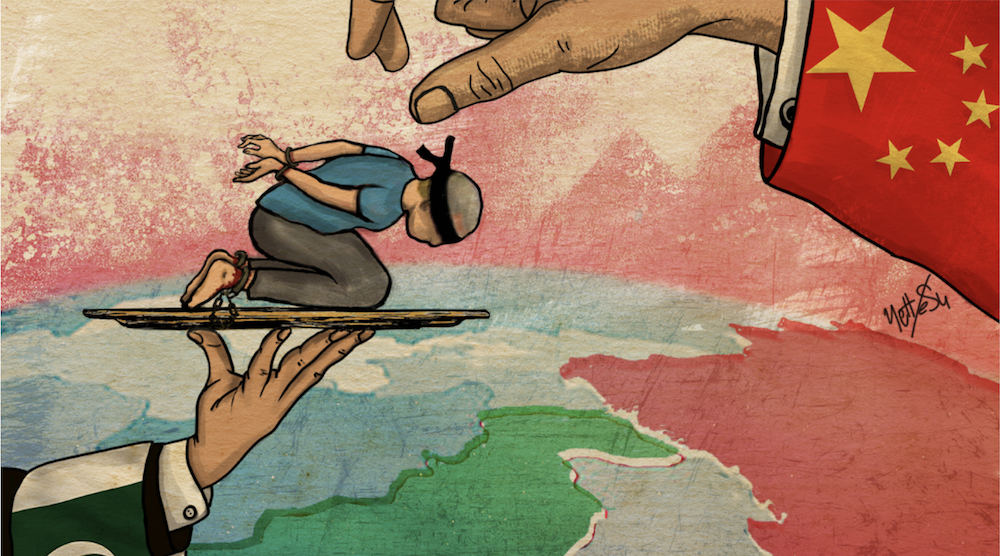By Tsering Dhundup
DHARAMSHALA, July 13: Marking the 9th death anniversary of revered religious and community leader Tulku Tenzin Delek Rinpoche who died in Chinese prison under mysterious circumstances, his niece released a book titled “The truth as told by Nyima Lhamo” in Dharamshala on Friday.
Nyima Lhamo, the niece of Tulku Tenzin Delek addressed the public through a pre-recorded video. She said, “This book is to bring to light Chinese authority’s false accusations on Tulku Tenzin Delek, his custodial death in Chinese prison and ordeals post Rinpoche’s demise through his my lens.”
Dorjee Rinchen, the writer of the book and a school teacher while speaking to the media stated, “Tulku Tenzin Delek in his lifetime has done a lot of work for Tibetan people like building schools, clinics, orphanages, religious institutions, and old-age homes. The resistance of Tibetans to Chinese rule has been prevalent, especially through artists and philanthropists who have been the thorn in the eyes of the Chinese authorities in Tibet. Tulku Tenzin Delek has also been one of the major thorns and the Chinese authorities have tried to subdue him. As Rinpoche’s work has been for the prosperity of the Tibetans, what happened to him is intolerable. So we have to do what we can to remember his work. Hence, I have written three books on Rinpoche earlier. In 2019 I met Rinpoche’s niece Nyima Lhamo and from that year we started writing the book”.
Geshe Tsering Dorjee, former political prisoner and student of Tulku Tenzin Delek said “ In Tulku Tenzin Delek school, the majority of the students were Chinese children. He never discriminated between the Chinese and Tibetan children and the same with men and women. He built monasteries for both monks and nuns. He also advocated for religious and provincial unity among Tibetans”.
Geshe Lhakdor, director of the Library of Tibetan Works and Archives said, “ I have nothing much to say, His Holiness The Dalai Lama said that Tulku Tenzin Delek was a true Lama and a true patriot of Tibet”.
Tulku Tenzin Delek was a much-revered and widely respected Tibetan religious leader who was recognized as a reincarnated lama by the Dalai Lama in the 1980s. He was much loved by Tibetans – especially among nomads in Lithang, the place of his birth. From Orthok Monastery, he fought for justice, health care, educational opportunities, and especially for a clean environment that has long irked Chinese authorities.
At the age of 65, Tulku Tenzin Delek died under mysterious circumstances on July 12, 2015, while serving a life sentence following what rights groups and supporters called a wrongful conviction on a charge of bombing a public square in the so called Sichuan’s provincial capital Chengdu in April 2002. He was initially sentenced to death with a two-year reprieve, and suspension of political rights for life, but the sentence was later commuted to life imprisonment. His attendant Lobsang Dhundop who was arrested with Tulku Tenzin Delek was executed on 26 January 2003.
At the sentencing hearing, Tulku Tenzin Delek declared his innocence. In a tape smuggled from detention in mid-January 2003 and obtained by Human Rights Watch, he repeated his claim, saying, “I have been wrongly accused. I have always said we should not so much as raise a hand against another.”
A report by Human Rights Watch in 2004 concluded that the charges against Tenzin Delek Rinpoche were politically motivated to undermine His Holiness the Dalai Lama as a religious leader and the Tibetan movement. “Based on interviews with numerous eyewitnesses, the report provides a detailed account of the circumstances surrounding Tenzin Delek’s arrest and conviction. It concludes that the case was the culmination of a decade-long effort by Chinese authorities to curb his efforts to foster Tibetan Buddhism, his support for the Dalai Lama as a religious leader, and his work to develop Tibetan social and cultural institutions. His efforts had become a focal point for Tibetans struggling to retain their cultural identity in the face of China’s restrictive policies and its continuing persecution of individuals attempting to push the accepted boundaries of cultural and social expression,” the HRW report said.










